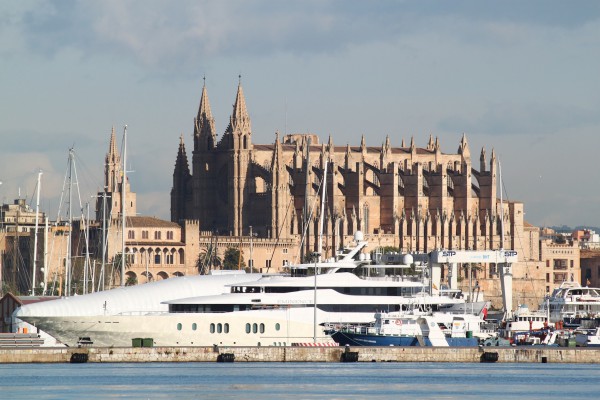Spanish Customs clarifies interpretation of Union Customs Code
An information note sets out the position of the Spanish tax authorities under the UCC relating to yachting…
On 10 October, 2018, the Department of Customs and Duties of the Spanish Tax Agency (AEAT) published an information note in which it clarifies various interpretative criteria relating to the entry and exit of yachts into and from the Union Customs Territory (UCT), as well as the use of the Temporary Admission (TA) scheme under the Union Customs Code (UCC). Miguel Ángel Serra Guasch, Partner at Albors Galiano Portales, summarises the points that the note sets out in the following:
· Upon entry or exit of Spanish waters, yachts without ‘Union good’ status (i.e. yachts not wholly manufactured in the UCT, not having paid the corresponding VAT or imported and released for free circulation within the UCT), which meet the requirements to be subject to the TA scheme (when the yacht is registered outside the UCT, in the name of a person resident outside the UCT and is also used by a person resident outside the UCT), do not have to lodge any type of express declaration to Customs. Instead, the mere crossing of the border, which is understood as 12 nautical miles from the coast, is sufficient.
· Upon entry or exit of Spanish waters, yachts with ‘Union good’ status (i.e. yachts manufactured in the UCT, having paid the corresponding VAT, or imported and released for free circulation within the UCT), whether they are flagged in the UCT or outside the UCT, do not have to lodge any type of express declaration to Customs to be subject to Returned Goods Relief (RGR), which allows yachts to be exported for a maximum period of three years and exempt from import VAT on their return to the UCT. Instead, the mere crossing of the border is sufficient;
· It is now possible for yachts that meet the requirements for TA to operate commercially (charter) in Spain, as long as this is allowed by regional regulations. This is the clear position of the European Commission expert group.
What has changed?
With regards the first point, Serra explains that the position of the Department of Customs and Duties of the Spanish Tax authorities (AEAT) is already well known, following a service note issued in November 2017, which was subsequently explained in an article published on SuperyachtNews.com in January 2018.
“With regards to the second point, the entry and exit of yachts flagged in the UCT (often incorrectly referred to as ‘EU-flags’) has never required the lodging of any type of express declaration to Customs given that the criterion provided by the UCC and its regulations (mainly Delegated Regulation (UE) 2015/2446) are clear in this respect,” says Serra. “This criterion is the same as that which was also clearly provided for in the now-repealed Community Customs Code (CCC).”
For the entry and exit of yachts with ‘Union good’ status that are registered with a flag not belonging to the UCT (also incorrectly referred to as ‘non-EU flags’), there are changes from the CCC. Serra explains that, for these yachts, some articles of the new UCC (in particular article 137) leave leeway for interpretation.
“In this case, the criterion does highlight an important change with respect to the former CCC,” explains Serra. “Based on the former CCC, Spanish Customs considered that in such cases it was necessary to have lodged, before leaving the UCT, a Single Administrative Document (the standard form used for customs declarations in the EU) in order to be subject to RGR. In the event that this was not complied with, Customs considered that the re-entry of the yacht in the UCT gave rise to import VAT, even if the yacht complied with the requirements of said scheme, as the yacht would have lost Union status when it left. The new criterion is that the mere crossing of the border is sufficient, and no longer is it necessary to file a Single Administrative Documents to benefit from the RGR.”
With regards to the third criterion set out in the information note, yachts are now allowed to operate commercially (charter) in Spain under TA, without prior import and release for free circulation in the UCT. This change is something that Serra communicated to the industry during SOS Yachting’s 4th Fiscal Meeting at the Monaco Yacht Show. “Such an option is not currently available in Italy or France, which are Spain’s neighbouring countries and main competitors in the superyacht charter market,” comments Serra. “These countries do require prior import and release for free circulation into the UCT for a yacht to be allowed to charter.”
Conclusion
“Given the above, it is important to highlight that none of the three aforementioned criteria are in any way ‘new’,” clarifies Serra. “Those of us who are in regular contact with the tax authorities are aware of the content of service notes of November 2017 and January 2018, which have already set out the aforementioned criteria and, therefore, we have already been applying and advising our clients and associates accordingly.”
The recently-published information note is a result of a recent meeting between the Customs authorities and the Spanish National Yachting Association (ANEN), to which Serra is tax advisor. “We suggested that the criteria that the Customs Authorities had been applying should be stated clearly in writing and, as a consequence, they issued the aforementioned note on the 10 October,” Serra concludes. “In this way, those who are not usually in contact with the Authorities can have access to such criteria and, therefore, act in accordance with them. This will now facilitate more comprehensive compliance with tax obligations, both in terms of customs and taxes, especially those related to import VAT.”
For those interested in finding out more about the impact of these criterion, there will be a follow-up article published on SuperyachtNews.com next week to look into the various caveats and nuances of the criteria.
NEW: Sign up for SuperyachtNewsweek!
Get the latest weekly news, in-depth reports, intelligence, and strategic insights, delivered directly from The Superyacht Group's editors and market analysts.
Stay at the forefront of the superyacht industry with SuperyachtNewsweek
Click here to become part of The Superyacht Group community, and join us in our mission to make this industry accessible to all, and prosperous for the long-term. We are offering access to the superyacht industry’s most comprehensive and longstanding archive of business-critical information, as well as a comprehensive, real-time superyacht fleet database, for just £10 per month, because we are One Industry with One Mission. Sign up here.
Related news

The tax landscape post-Brexit
Patrick Maflin, director at Marine Accounts, discusses the possible impact of Brexit on British seafarers
Crew
Related news
The tax landscape post-Brexit
7 years ago
NEW: Sign up for
SuperyachtNewsweek!
Get the latest weekly news, in-depth reports, intelligence, and strategic insights, delivered directly from The Superyacht Group's editors and market analysts.
Stay at the forefront of the superyacht industry with SuperyachtNewsweek




